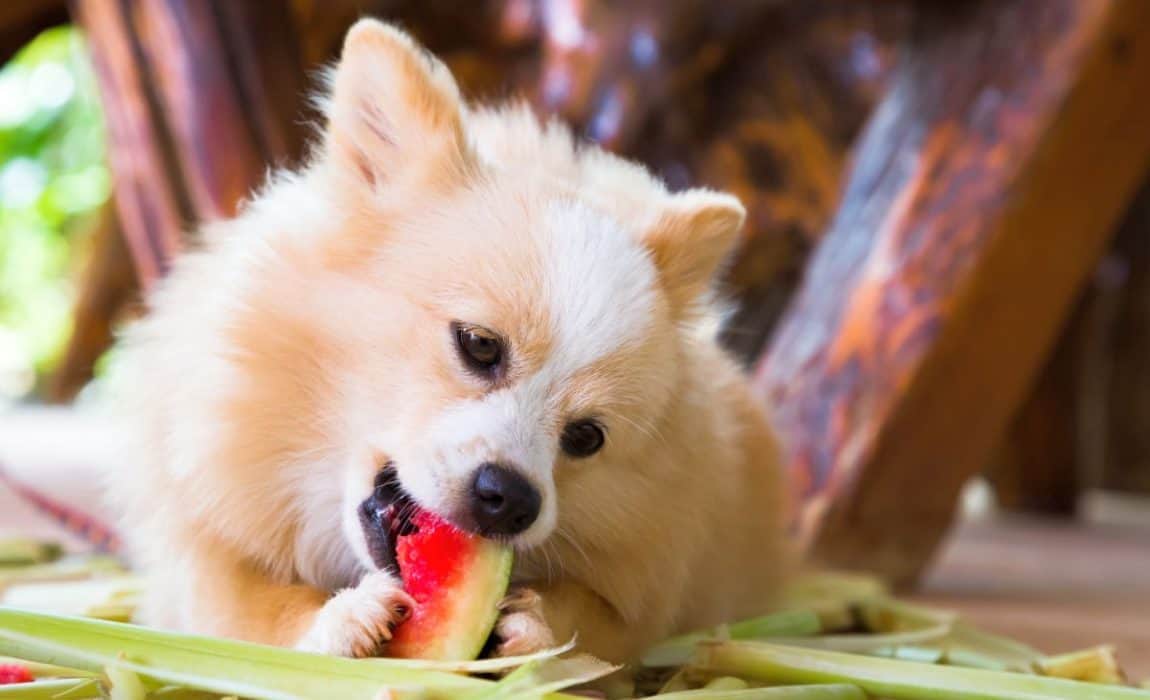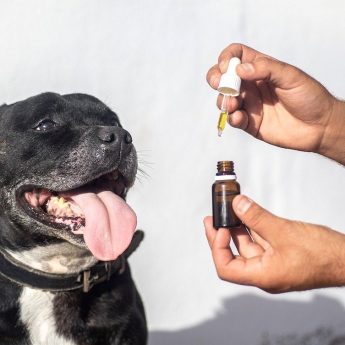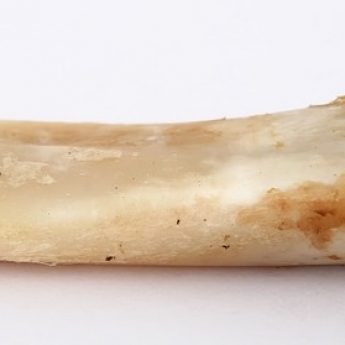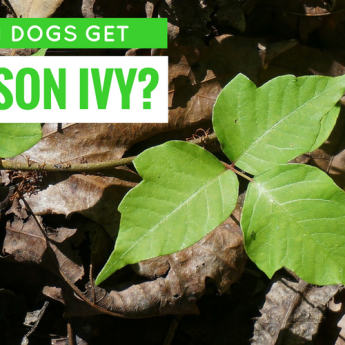Many owners enjoy giving their dog the occasional “people food” treat. As long as you do so in moderation, this shouldn’t be a problem for most healthy dogs.
You just need to be careful when picking foods to share with your pooch, as many common table foods are toxic to dogs.
Although there are a few exceptions (with grapes being the most notable example), most fruits are safe to give to dogs – you just have to make sure you remove any indigestible or toxic parts of the fruit before offering them to your canine.
Take watermelon, for example. The juicy, red flesh of a watermelon is perfectly safe for your dog, but you’ll want to remove the seeds and rind before offering pieces to your pooch.
We’ll talk more about feeding your dog watermelon below, talk about its nutritional value, and provide a few serving suggestions to make it easier to share with your dog on a hot summer day.
Key Takeaways: Is Watermelon Safe for Dogs?
- Yes — the ripe red flesh of watermelons is safe to share with your dog (in moderation). Just be sure to avoid giving Fluffy the rind or seeds.
- Watermelon is pretty sweet, which can cause canine diarrhea. So, be extra-careful about offering your dog watermelon if she’s diabetic or has chronic stomach issues.
- Watermelon is mostly comprised of water and sugar. It does contain a handful of vitamins and minerals, but not enough that you should go out of your way to provide it to your pooch.
What Is a Watermelon, Anyway?
At first glance, watermelon seems like a pretty unusual food item. But upon closer inspection, it’s not quite as odd as you may initially think.
Although many people think of things that grow from the ground as vegetables, watermelon is technically a fruit (biologically speaking, anything with seeds is a fruit). In fact, watermelon is a type of berry – albeit one of the biggest berries in the world.
Originally developed in Northeast Africa, watermelons are now grown all over the world. Most watermelons are full of dark brown to black seeds, but botanists have created seedless varieties, which are easier for people (and pooches) to eat.
Watermelon also has a hard, green rind covering the outside of the fruit. This rind is actually edible if cooked, but most people simply eat the flesh and discard the rind.
Watermelon Safety: Things to Think About When Spoiling Your Pet
Watermelon is usually an acceptable food to share with your pet, but you’ll want to make sure you do a few things to make it as safe as possible for your pup. That means doing the following:
- Wash the watermelon before cutting into it. Like every other fruit or vegetable you purchase or pick, you should wash watermelons before cutting and serving them to your dog (or yourself, for that matter). The outer rind of the fruit may be contaminated with an assortment of bacteria and pesticides. If you start cutting into the fruit before washing it, you may end up contaminating the internal flesh.
- Cut the watermelon into bite-sized pieces to prevent choking. Admittedly, watermelon flesh isn’t terribly likely to choke your dog. It’s mostly made of water and a tiny bit of fiber, so it’d likely dissolve in your dog’s mouth long before it could cause her to choke. But, it’s better to be safe than sorry, so cut up that juicy flesh into pup-appropriate pieces.
- Remove the rind completely. As mentioned earlier, humans can actually eat cooked watermelon rind. However, your dog probably won’t be able to digest it as well as you can, cooking the rind is a pain, and your dog probably won’t even benefit from the vitamins and minerals it contains. And unlike the flesh, the rind may represent a choking hazard. Just err on the side of caution and skip the rind entirely.
- Pick out any seeds. Like the rind, watermelon seeds may cause your dog to choke, so you’ll want to remove them before sharing pieces with your dog. This can be a bit laborious, so just opt for seedless watermelons whenever possible.
- Don’t overdo it. Watermelon flesh is safe for dogs, and there’s nothing toxic about it. However, it is full of sugar, which can cause diarrhea in some dogs. So, be sure to offer your dog watermelon in moderation. Give your pooch two or three bite-sized pieces and put the rest away for later.
- Don’t offer watermelon to diabetic dogs. Because watermelons contain quite a bit of sugar, you don’t want to feed this fruit to dogs suffering from diabetes or digestive problems.

What About Other Melons? Are Cantaloupe and Honeydew Safe For Dogs?
Most melons, including cantaloupe and honeydew melon, are safe for dogs to eat. As with watermelon, just be sure to wash the fruits thoroughly, remove the rind, and cut the flesh into bite-sized pieces before sharing them with your dog.
Note that these fruits – particularly honeydew melons – are also rich in sugar, so offer them in moderation and don’t give them to dogs suffering from diabetes or digestive problems.
Watermelon Nutritional Information: How Healthy Is It For Your Dog?
Watermelon isn’t the most nutritious food in the world, but it does provide a few things your dog’s body needs, and it is relatively low in calories. A few of the most noteworthy things to know about the nutritional value of watermelon are discussed below.
- Calories – Watermelon is a pretty low-calorie food, and each ounce of flesh contains only 8.4 Calories. As a comparison, brown rice has about 31 Calories per ounce, while chicken breast has more than 46 Calories per ounce.
- Fat – Zip, zilch, nada. Watermelon is a fat-free food, hence its popularity with some human dieters.
- Carbs – Watermelon flesh contains about 2 grams of carbohydrates per ounce. That’s not as much as some other fruits and vegetables, but unfortunately, these carbs are almost entirely represented by sugars. In fact, each ounce of watermelon flesh contains 1.7 grams of sugar – that’s as much as some of the sugar packs used to sweeten coffee.
- Water – Most fruits are full of water, but it probably shouldn’t come as a surprise that watermelon is especially juicy. Every ounce of watermelon flesh contains 25.6 grams of water. That means that water makes up more than 90% of a typical melon ball.
- Fiber – Watermelon has a tiny bit of fiber, but not enough to write home about. Each ounce of watermelon flesh contains about 0.1 grams of fiber.
- Vitamins and Minerals – Watermelon may not be as nutritious as some other fruits and vegetables, but it does provide a few important vitamins and minerals. It has quite a bit of Vitamin A, which is important for dog health, as well as a tiny bit of potassium, which is also important. It also contains some Vitamin C, but your dog’s body produces this vitamin internally, so it doesn’t provide a great deal of value when eaten.
The takeaway? Watermelon doesn’t really provide a ton of nutrition; it’s pretty much water and sugar. But, many dogs find this combination of sugar and water tasty, and it doesn’t have a lot of calories. So, it makes a pretty good treat when offered in moderation.
Watermelon For Dogs Serving Suggestions
Although it may be fun to punch a hole in a watermelon and let your pup slurp it up like some kind of brain-eating zombie, this probably isn’t the best idea. Not only would this allow your dog to overindulge, but it’d also make quite a mess too.
So, you’ll want to put in a little effort to prepare the watermelon for your pooch. A few of the most effective ways to do so are discussed below.
- Make melon balls. Melon balls are very easy to store, and they are the perfect shape for snacking. Just be sure to get a melon baller that makes balls of the appropriate size. Large melon balls are typically about 1 ½ inches in diameter, which is a good size for labs, pits, Rotties, Dobies, shepherds, and other big pups. But terriers and toy breeds will need smaller melon balls, which are about ½ inch or less in diameter.
- Cut the watermelon into tiny pieces and use it as a food topper. Because watermelon is packed with flavor, it can make a great food topper for picky pups. Just be sure to account for the additional calories and sugar your dog will be eating, if you intend to do so regularly.
- Freeze small cubes or balls for a mid–summer treat. Dogs often enjoy frozen snacks on hot days, and watermelon can work very well in such contexts. Just be sure to give the frozen treats to your dog outside – they’re likely to make quite a mess as your dog plays with and eats them.
- Add very small pieces to the water bowls of poor drinkers. Some dogs don’t seem to drink enough water on a daily basis, which can lead to a variety of health problems. But, if your pooch likes the taste of watermelon, you may be able to convince her to drink more water and stay hydrated by adding a few small pieces of watermelon to her water. The pieces will likely dissolve a bit over time, which will allow the watermelon flavor to combine with the water.
***
I don’t really like watermelon myself, so my dog doesn’t get it very often. However, every once in a while, I’ll buy some of those freshly cut fruit cups from the grocery store, so I can spoil her in the way she deserves (note that these cups sometimes include grapes – you’ll want to remove those, as they’re toxic to dogs).
These watermelon pieces are ready to feed as-is, and she seems to love them. Meanwhile, I get to brighten my pup’s day while giving her low-calorie, but delicious treat.
Do you ever share watermelon with your dog? Do you have any clever serving suggestions you’d like to share? Let us know in the comments below!









No Comments